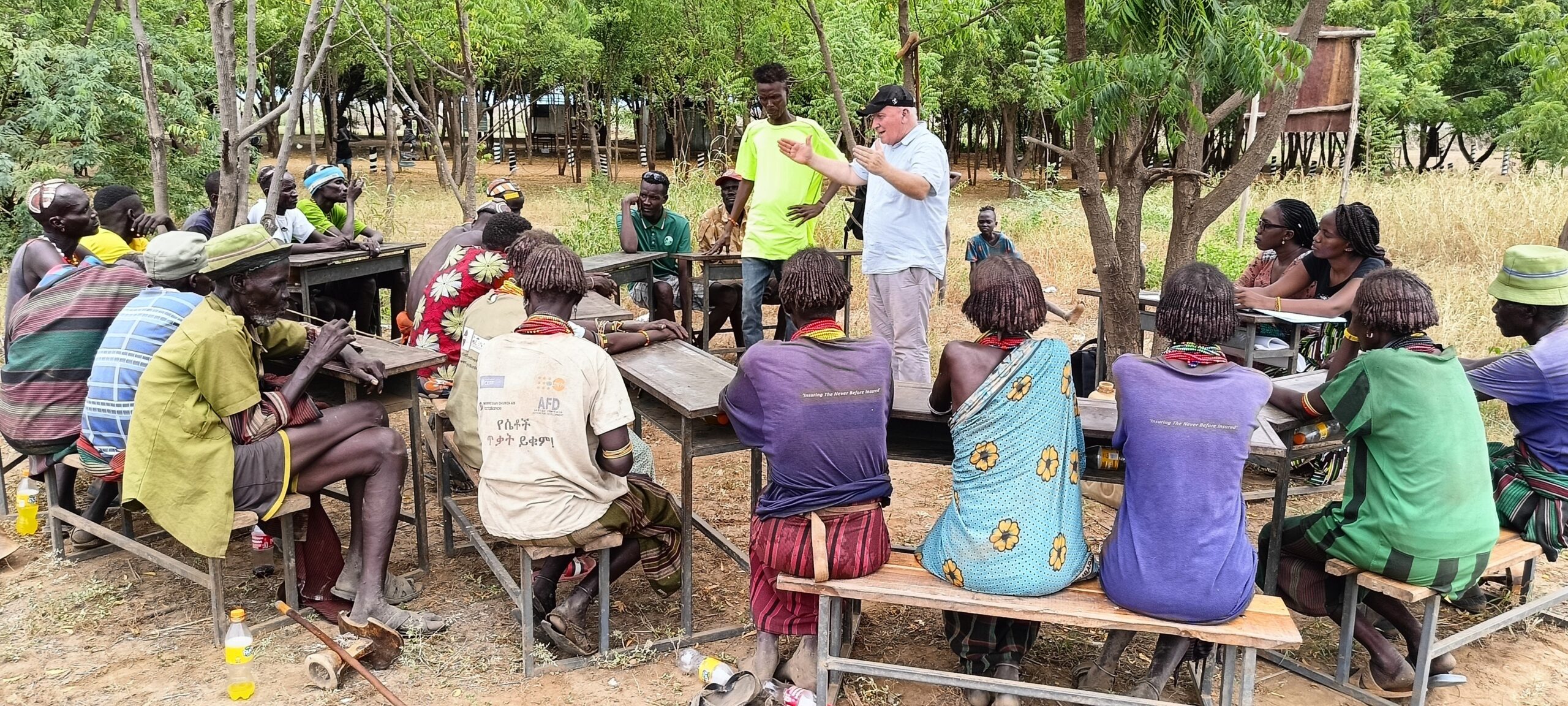By: Austin Macharia MA,
“Shalom-SCCRR’s led conflict transformation and peacebuilding interventions in the region have had a great and positive impact on the lives of the people.” (Mr. Buite Nyeite Dassanech)
Shalom Center for Conflict Resolution and Reconciliation (SCCRR) initiative along the Kenya-Ethiopia borderline (South of Omo) targeting the Turkana and Dassanech ethnic communities (tribes) is a commendable effort. These two communities have been engaged in a protracted conflict over the contested ownership and usage of the available natural resources, particularly grazing land and water. Additionally, livestock theft, revenge, and border disputes have remained critical causal factors. Other than the loss of lives, maiming, and displacement, which the communities have had to bear with, the violent inter-ethnic conflict has made it difficult for both communities to experience any significant sustainable economic development and social stability.
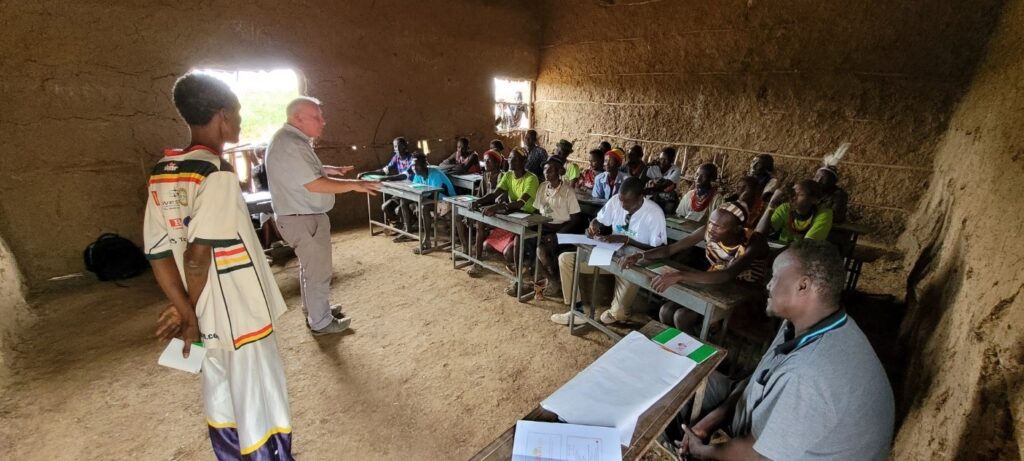
Shalom-SCCRR Executive Director, Fr Oliver Noonan MA. (Ph.D. Candidate), engaging community peace group members on conflict resolution (Peace, Truth, Justice, and Mercy) at Nyemomeri Village in Ethiopia.
Frequently used research study by Shalom-SCCRR under the professional guidance of Rev. Fr. Patrick Devine, Ph.D. assisted by Prof. Wanakayi K. Omoka and Prof. Robert Mudida, established four main underlying causes of conflict in this area: competition for environmental resources (water and pasture land), contested territory in regards to boundaries, cultural variations between the Turkana and Dassenach communities, and state neglect evident in the lack of institutions to enable the people to meet their basic human needs and actualize their potentials (Devine, 2009).
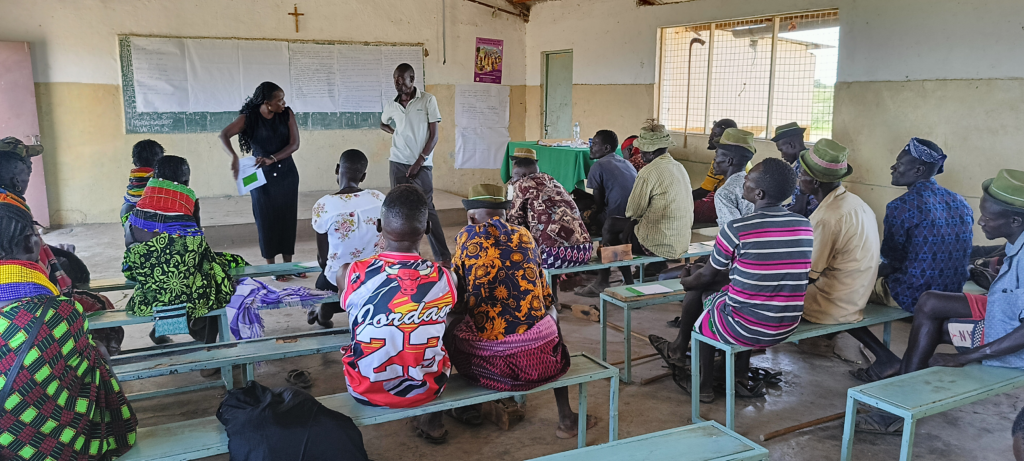
Shalom-SCCRR’s conflict transformation/ peacebuilding intervention in the Ilemi region has, over the years, aimed at addressing the root causes of the conflict and fostering trust and cooperation between the two communities that have manifested adversarial relationships for ages. The organization is working with both communities to not only identify and solve their conflict-related problems but, more importantly, develop collaborative and sustainable solutions. Shalom- SCCRR continues to progressively capacity-build communities through training workshops and support community-led interventions for conflict resolution and peacebuilding.

Shalom’s initiative among these communities has made tremendous impacts in recent years. Turkana and Dassanech communities have begun to cooperate towards implementing different inter-communal activities, such as in the management of the available natural resources –sharing of water points and grazing fields. These communities have also established a joint conflict intervention and conflict resolution committee that has constantly been instrumental in addressing conflicts that may arise and assisting Shalom-SCCRR in infrastructure development projects
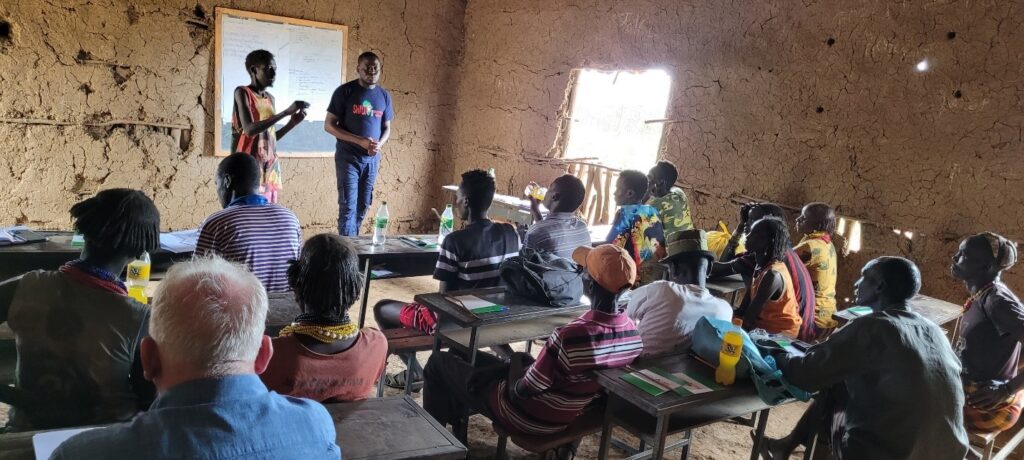
Shalom-SCCRR’s Mr. Moses Osiro MA, leading a workshop session on Conflict Resolution in the conflict environment.
Mr. Buite Nyeite, a Dassanech peace committee member, observed that “Shalom-SCCRR’s led conflict transformation and peacebuilding interventions in the region have had a great and positive impact on the lives of the people. Due to the improving inter-ethnic relationship along the border, it has been possible to initiate a farming program, particularly with the Dassanech community, which has historically shown no interest in farming. In the past year, for instance, the community harvested significant quantities of millet and sorghum, products that have awakened trade and, thus, peaceful interaction with their Turkana neighbors. We immensely thank shalom-SCCRR.”
Additionally, Mr. Francis Ekiru, a Turkana Peace Committee member, stated that “the violence that characterized most of the conflicts between Turkana and Dassenach in this region has significantly decreased, and the communities have begun to gradually recover from the effects of this prolonged conflict. We can attribute the improved inter-communal relations between the two communities to Shalom’s conflict transformation/peacebuilding interventions in this borderline.”
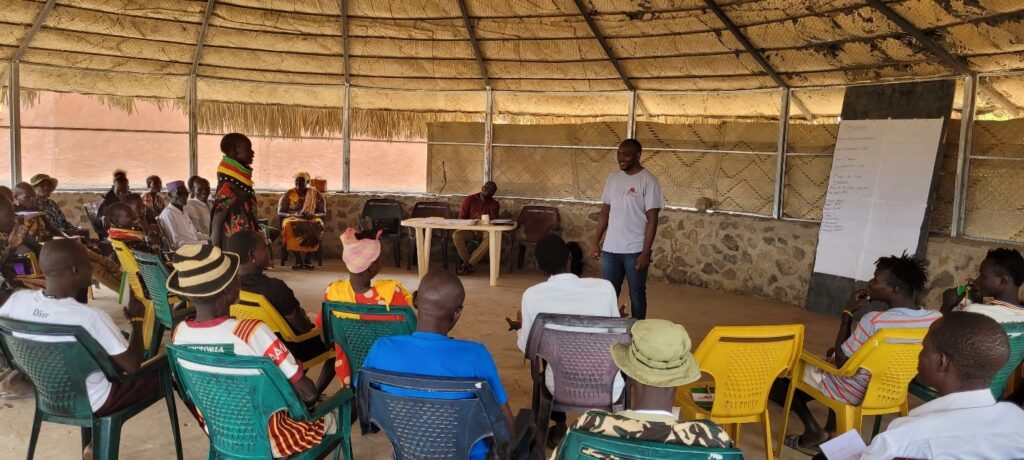
Shalom-SCCRR’s Mr. Austin Macharia MA, engaging with Turkana Peace committee members during an interactive session in Todonyang, Turkana County, on their role in peacebuilding.
Alongside the peacebuilding interventions, Shalom-SCCRR is also providing School/Educational Development support to inter-ethnic and inter-religious schools along the Kenya-Ethiopia borderline. In the past 10 years, Shalom-SCCRR has implemented 57 significant School/Educational Development Projects in the Ilemi Triangle, developing inter-ethnic and inter-religious school/educational institutions and other community empowerment infrastructures. The support of these educational institutions has provided poor and vulnerable children with an opportunity to easily access equity and quality education. We are also supporting other community empowerment and security-enabling infrastructure in the region, particularly the road access between the marginalized Nyang’atom and Toposa regions of South Ethiopia and South Sudan. These projects are benefiting these pastoralist communities in these conflict and marginalized areas.
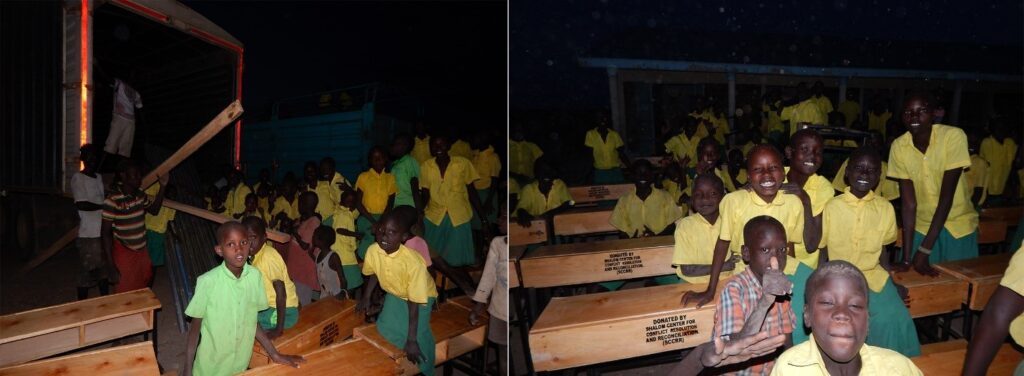
Shalom-SCCRR logistics team after a long and tough journey to Kokuro Primary School located in a remote marginalized area in Turkana County, northern Kenya. The school lacks essential teaching and learning materials and furniture for pupils. Receiving these Shalom educational material support are delighted pupils and teachers from the school. “We are forever grateful!”… Mr. Serem, the head teacher remarked.

Pupils from Todonyang’ Primary School in Turkana, northern Kenya, receiving textbooks donated by Shalom-SCCRR. The school has continually received materials for infrastructural and educational development from Shalom-SCCRR.
Notwithstanding the great initiatives, the conflict between Turkana and Dassanech communities is complex and has deep roots. It is worth noting that there are still some challenges between these communities that need to be addressed. Some of these challenges are over-grazing, climate change, less diverse forms of livelihood and economic activities like farming, over-dependence on livestock keeping as the sole livelihood opportunity, and the lack of adequate collaborative security management along the borderline, especially between the Kenya and Ethiopia governments.
Shalom-SCCRR continues to invest its expertise, time, and effort to help these communities overcome these challenges and build sustainable peace and cooperation among themselves. Shalom-SCCRR’s initiatives are being appreciated as a step in the right direction, and the two communities’ willingness to steer their own peaceful coexistence is an indication that such violent conflict will soon be a thing of the past. Shalom-SCCRR continues its commitment to journeying with these and other conflicting communities in Eastern Africa, in pursuit of positive peace and sustainable development.
Author:
Austin Macharia MA, Shalom-SCCRR’s Projects Officer, Ilemi Triangle.
Relevant Links
- Osiro, M, & Macharia, A. (2023). Harnessing the Peace Dividends of Shalom-SCCRR’s Transformative Interventions in the Ilemi Triangle; borderline between Omorate in Ethiopia and Kokuro in Kenya. https://shalomconflictcenter.org/harnessing-the-peace-dividends-in-the-ilemi-triangle-along-the-kenya-and-ethiopia-borderline-shalom-sccrrs-transformative-intervention-strategies-in-omorate-in-ethiopia-and-kokuro-in-kenya/
- Macharia, A. & Awed, A. (2021). Lazarus Epae Ereng (Assistant Chief, Nachukui-Turkana County) Attest to Shalom-SCCRR’s Impact & Peacebuilding Dividends along the Kenya-Ethiopian border. https://shalomconflictcenter.org/lazarus-epae-ereng-assistant-chief-nachukui-turkana-county-attests-to-shaloms-impact-peacebuilding-dividents-along-the-kenya-ethiopia-border/
- The Peace Dialogue, Issue No. 19, Hekima Institute of Peace Studies and International Relations (HIPSIR): TURKANA-DASSANECH CONFLICT: CAUSES AND CONSEQUENCES By Devine, P. R. https://shalomconflictcenter.org/wp-content/uploads/2021/02/TURKANA-DASSENACH-CONFLICT-PUBLISHED-BY-HEKIMA-Peace-Dialogue-Issue-19.pdf
- Okoth, G. & Erot, P. (2019). Shalom-SCCRR’s International Chairman Intervened to Save the Lives of Lazarus Epae and Paul Agis in the Ilemi Triangle Region.https://shalomconflictcenter.org/wp-content/uploads/2021/02/SHALOM-SCCRR-INTERNATIONAL-CHAIRMAN-INTERVENED-TO-SAVE-THE-LIVES-OF-LAZARUS-EPAE-AND-PAUL-AGIS-IN-THE-ILEMI-TRIANGLE-REGION.-1.pdf
- Macharia, A. (2020).Briefing Paper No. 2: An Analysis of Turkana Dassenach Conflict; Diminishing Role of Traditional Mechanisms in the Management of Pastoralist Conflict. https://shalomconflictcenter.org/briefing-paper-no-2-an-analysis-of-turkana-dassenach-conflict/
- Devine, P. R., (2009). Turkana – Dassanech conflict: Causes and Consequences. (Unpublished Master’s dissertation). Hekima Institute of Peace Studies and International Relations (HIPSIR), Catholic University of Eastern Africa, Nairobi, Kenya. Available at: https://shalomconflictcenter.org/wp-content/uploads/2021/01/TURKANA-DASSENACH-CONFLICT_CAUSES-AND-CONSEQUENCES.pdf
- Shalom-SCCRR. (2015). Shalom Signs Memorandum of Understanding with IGAD. https://shalomconflictcenter.org/shalom-signs-memorandum-of-understanding-with-igad/
- Haskin, C. (2009). The Ilemi Triangle: A Forgotten Conflict.https://shalomconflictcenter.org/wp-content/uploads/2021/02/THE-ILEMI-TRIANGLE_-A-FORGOTTEN-CONFLICT-CHARLES-HASKINS_-2009.pdf
- Erot. P. (2020). Briefing Paper No. 11: Climate Change, Lake Turkana, and Inter-Communal Conflicts in the Ilemi Triangle Region. https://shalomconflictcenter.org/briefing-paper-no-11/
- Macharia, A. (2019). Shalom-SCCRR’s Conflict Research in the Ilemi Triangle: To Empower the Local Ethnic Groups to be the Architects of Their Interdependent Future. https://shalomconflictcenter.org/shaloms-sccrr-conflict-research-in-the-iemi-triangle-to-empower-the-local-ethnic-groups-to-be-the-architects-of-their-interdependent-future/
- Mwangi, F. (2019). The Ilemi Triangle’; Shalom-SCCRR’s Conflict Pre-Assessments with Cross-Border Communities. https://shalomconflictcenter.org/the-ilemi-triangle-shalom-sccrrs-conflict-pre-assessments-with-cross-border-communities/
- Shalom- SCCRR. (2023). 2009-2022 Shalom-SCCRR Results and Achievements.https://shalomconflictcenter.org/wp-content/uploads/2023/06/13-Years-of-Shalom-SCCRR-2009-2022-SV-20230624.pdf
- Shalom-SCCRR. (2023). Prof. Wanakayi K. Omoka’s Understanding of the Philosophy and Work of Shalom-SCCRR Recollected; Augmented with 2022 Results by the Dept. of Monitoring, Evaluation, Research, and Learning (MERL). https://shalomconflictcenter.org/recalling-prof-wanakayi-k-omoka-phd-understanding-of-the-philosophy-and-work-of-shalom-sccrr-augmented-with-2022-shalom-sccrrs-achievements-and-results/
- Shalom-SCCRR. (2022). Shalom Empowerment Center (SEC) Addressing Violence against Women and Children: Concept Document. https://shalomconflictcenter.org/eastern-africa-shalom-empowerment-center-sec-addressing-violence-against-women-and-children-concept-document/
- Devine, P. R. (2023). Shalom-SCCRR Chairman’s Report on Progress and Achievements in 2022. https://shalomconflictcenter.org/chairmans-report-on-progress-and-achievements-in-2022/

